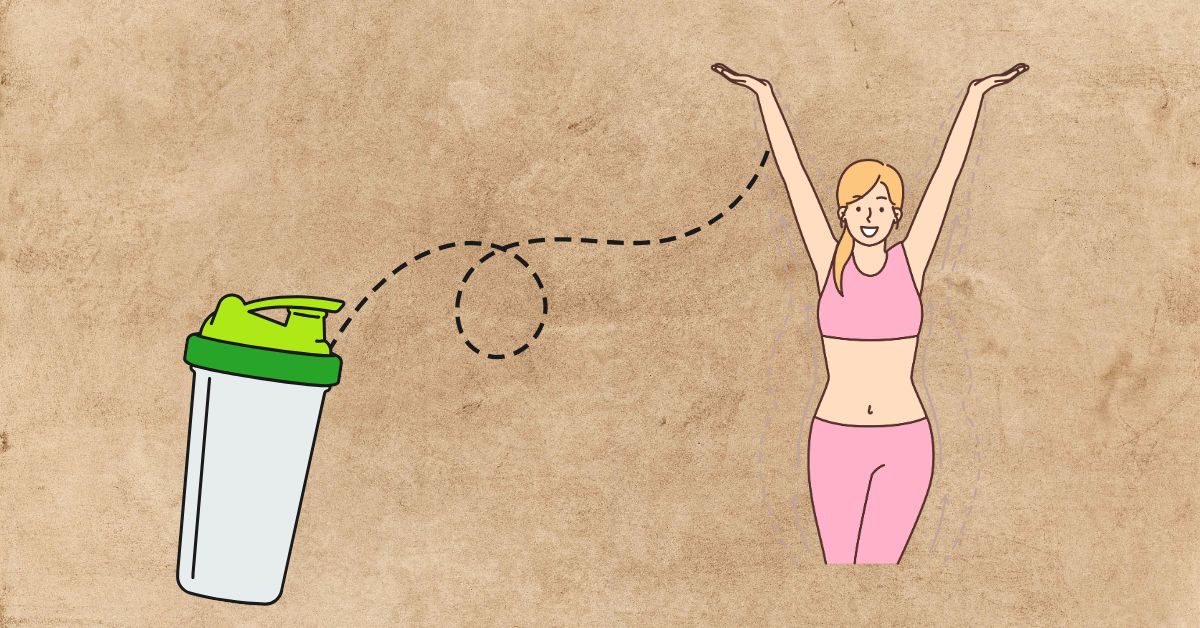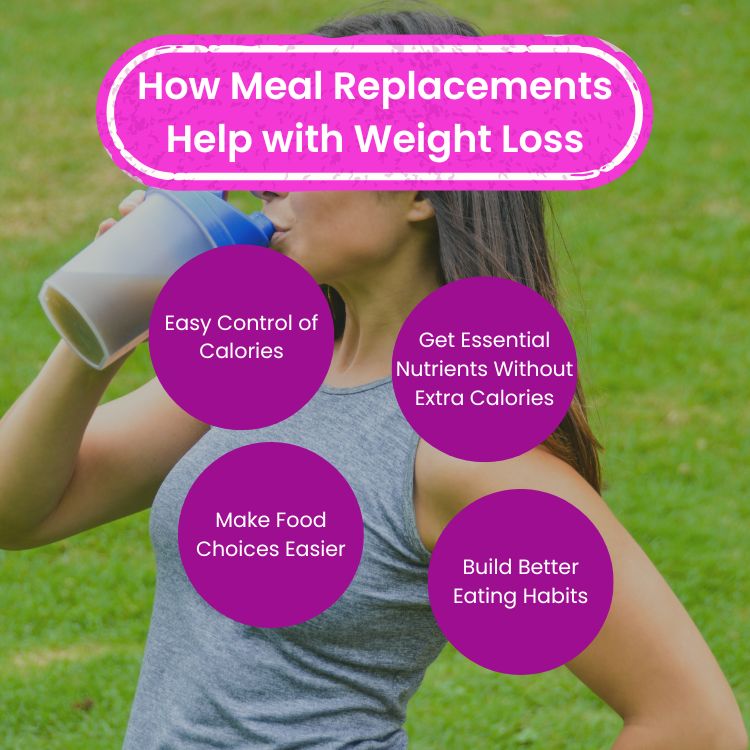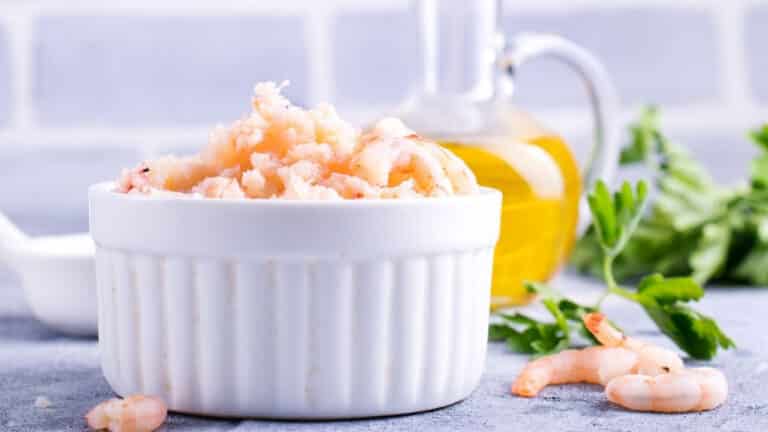Imagine this: you’re rushing through your busy day, juggling work, family, and everything in between. As you check the time, you realize you’ve skipped lunch yet again. In desperation, you grab a sugary snack or fast food to tide you over, promising yourself you’ll eat better tomorrow. Sound familiar?
If you’re trying to lose weight or simply eat healthier, meal replacements can be a game-changer. In fact, according to a recent study, using meal replacements as part of a calorie-controlled diet can help people lose 5–10% of their body weight in just a few months. These convenient, nutrient-packed options not only save you time but also help you avoid unhealthy temptations.
In this article, we’ll explore the best foods you can use as meal replacements to support your weight loss journey. We’ll cover nutrient-dense options that keep you full, energized, and satisfied—without the extra calories. Let’s dive in and discover how you can achieve your health goals while keeping life simple and delicious!
What Are Meal Replacements?
Meal replacements are a practical, no-fuss way to keep nutrition on track—perfect for those days when life doesn’t leave much time for a sit-down meal. These are ready-made foods, like shakes, bars, soups, or smoothies, that deliver the essential nutrients found in a balanced meal without the need to cook or plan. Designed to be filling and nutrient-dense, meal replacements provide a quick solution to help people manage their diets, especially when they’re trying to lose weight or maintain healthy habits.
Types of Meal Replacements for Weight Loss: Finding What Works for You
Meal replacements aren’t one-size-fits-all. Here’s a quick rundown of what’s available so you can pick what suits your needs:
Protein-Packed Options: Think of these as the best choice for curbing hunger and supporting energy levels. Loaded with protein, these options keep you full longer and work well for anyone looking to feel satisfied while managing calories.
Low-Calorie Choices: These are great for those trying to create a calorie deficit without skimping on nutrition. Low-calorie meal replacements often come in shakes and bars, offering vitamins, fiber, and minimal sugar for a balanced, light meal.
Fiber-Rich Meals: Fiber is a powerhouse for digestion and fullness, so if you find yourself snacking between meals, fiber-rich meal replacements might be the way to go. Options with added oats or vegetable fiber keep you feeling full for longer stretches.
Soup and Smoothie Choices: Not a fan of traditional shakes or bars? Some people find savory soups or fresh smoothies more satisfying. These meal replacements provide a comforting, refreshing alternative that’s still packed with nutrients.
Specialized Options for Unique Diets: Whether you’re vegan, gluten-free, or keto, there’s likely a meal replacement out there that meets your needs. Options for specific diets have expanded in recent years, meaning you don’t have to compromise on ingredients or flavor.
Meal replacements offer a quick, balanced way to stay on track with nutrition, especially on busy days. With options ranging from protein-packed shakes to fiber-rich soups, there’s something to suit every lifestyle and dietary need. They provide essential nutrients and can support weight management without the need for constant meal prep.
How Meal Replacements Help with Weight Loss
Meal replacements can be a real lifesaver for anyone trying to lose weight without a ton of fuss. They’re simple, practical, and designed to make a balanced diet easier to stick to—especially on those busy days when a full meal just isn’t an option. Here’s why they work so well for weight loss.
Easy Control of Calories
The pre-portioned nature of meal replacements makes it easier to cut back on calorie consumption without exerting additional effort. Creating the calorie deficit that is necessary for consistent weight loss can be accomplished by substituting one or two meals per day.
Get Essential Nutrients Without Extra Calories
Despite having fewer calories, these products are packed with protein, fiber, and other essential nutrients. In this way, your body is able to remain nourished and energized, allowing you to maintain an active lifestyle and burn more calories.
Reduce Cravings and Feel Fuller
The high protein and fiber content of meal replacements makes it possible to feel satisfied for a longer period of time. This, in turn, reduces the desire to snack on unhealthy foods, which in turn makes it possible to feel satisfied for longer time periods.
Quick and Easy Meals for Busy Days
Meal replacements provide a quick and nutritious alternative to traditional meals when time is of the essence. Because of this convenience, you are able to avoid skipping meals or turning to fast food that is high in calories.
Make Food Choices Easier
When you have options that are ready to go, you will not have to give much thought to what you are going to eat. Because of this, it is much simpler to refrain from making impulsive and unhealthy food choices.
Build Better Eating Habits
When you use meal replacements, it can be easier to establish a regular eating routine for yourself. This structure can help someone lose weight over a longer period of time and make it simpler to make the transition to eating healthy meals that are made from whole foods over time.
All in all, meal replacements are an easy, straightforward tool for anyone looking to simplify their weight loss journey. They help with portion control, add convenience, provide balanced nutrition, and reduce cravings—making it easier to stay on track, no matter what your day throws at you.
Key Nutrients to Look for in Meal Replacements for Weight Loss
When choosing the best meal replacements for weight loss, it’s essential to focus on the nutrients inside. These ingredients help you feel full, maintain energy, and stay on track with your goals. Let’s break down the key nutrients that make a difference in effective weight loss meal replacements:
Protein: The Powerhouse for Fullness and Muscle Support
Protein is a must-have in any weight loss plan. It keeps you satisfied longer, making it easier to resist snacking between meals. Plus, protein helps support muscle health, which is important for maintaining metabolism as you lose weight. Look for meal replacements with at least 15-20 grams of protein to maximize these benefits.
Fiber: Nature’s Best Hunger Buster
Think of fiber as your hunger’s best friend—it fills you up and promotes healthy digestion. High-fiber meal replacements are great for weight loss because they keep you feeling full for hours, making it easier to stay focused and avoid extra snacks. Fiber also helps balance blood sugar levels, reducing those sudden cravings for sweets.
Healthy Fats: Keeps You Energized and Satisfied
Healthy fats, such as those from nuts, seeds, or avocado, add richness to a meal replacement, helping you feel full and satisfied. They’re great for providing steady energy throughout the day and are beneficial for heart health. Look for meal replacements with around 5-10 grams of healthy fats for balanced nutrition.
Essential Vitamins and Minerals: Covering Your Nutritional Bases
A good meal replacement for weight loss should offer a variety of vitamins and minerals to support overall health, especially when you’re cutting calories. Nutrients like B vitamins (for energy), calcium (for strong bones), and iron (for oxygen flow) keep your body nourished and ready to go. Checking the label for these essentials can ensure you’re getting a balanced, complete meal.
Low Sugar Content: Avoiding Empty Calories and Energy Slumps
While a little sweetness is okay, too much sugar can lead to energy crashes and extra calories. Look for meal replacements with low sugar (preferably under 10 grams) or those sweetened naturally to avoid these pitfalls. This way, you get steady energy without the sugar highs and lows, helping you stay on weight loss track.
Incorporating these key nutrients into your meal replacement can make all the difference in staying satisfied and on track with your weight loss journey. With the right balance of ingredients, you can enjoy a meal that’s convenient, nutritious, and supportive of your goals—making weight loss a little simpler every day.
How to Choose the Right Meal Replacement for Your Weight Loss Goals
Choosing the right meal replacement for weight loss can make reaching your goals simpler and more effective. Here’s a quick guide to help you find a meal replacement that’s convenient, nutritious, and tailored to your needs.
Check the Calorie Content
Wondering how many calories to aim for? Ideally, a meal replacement should fall between 200-400 calories, depending on whether you’re using it as a snack or a full meal. This range helps you manage your intake and stay satisfied without going overboard.
Choose the Right Protein for Your Goals
When it comes to meal replacements for weight loss, not all proteins are created equal. Selecting a high-quality protein—whether it’s whey, casein, or plant-based options like soy and pea—ensures you’re getting the nutrients that best support your weight loss journey. Look for proteins that are both easily digestible and effective for meal replacement, as they’ll provide the right balance of nourishment without excess calories. Choosing the right protein keeps you on track with your goals, making it easier to stick to your plan even on busy days.
Match to Your Dietary Needs and Preferences
If your weight loss plan includes specific dietary requirements, meal replacements offer tailored options to fit your needs. From gluten-free and keto-friendly to vegan varieties, there’s a meal replacement for nearly every dietary approach. Be sure to check labels for any ingredients you’re avoiding, so your choice supports both your weight loss goals and any dietary restrictions seamlessly.
Opt for Real, Simple Ingredients
Choosing meal replacements with simple, whole ingredients can be key for effective weight loss. Look for options with short ingredient lists, free from unnecessary fillers, artificial additives, and added sugars. If you prefer a hint of sweetness, opt for products with natural sweeteners like stevia or monk fruit to keep extra calories at a minimum, supporting your weight loss efforts while providing satisfying nourishment.
Quick Tip: Read the Label Like a Pro
Take a moment to scan the ingredient list and nutrition facts. Look for:
- Protein: 15-20 grams to keep you full
- Fiber: 3-5 grams for digestion and fullness
- Healthy fats: Provides steady energy
- Essential vitamins and minerals: For balanced nutrition
It is good what we have now, but I want to show how one small change can make the whole thing better and raise the quality of the writing. When we have similar topics focusing like this helps us to write them without similarities. Although the information will be the same, this way of focusing will not let them match up.
Potential Downsides of Meal Replacements for Weight Loss and How to Avoid Them
While meal replacements offer convenience, they also come with potential downsides. Here’s how to avoid common issues and make the most of your meal replacement journey:
Lack of Variety
Ever felt bored of the same flavor shake? Sticking to one or two meal replacement flavors can quickly feel repetitive, making it harder to stay on track.
Solution: Try rotating different flavors or experimenting with various brands each week. Adding fresh ingredients like fruits, greens, or nuts to shakes is another way to switch things up and keep meal replacements satisfying.
Risk of Dependency
Relying only on meal replacements can make it challenging to build long-term healthy habits with whole foods. While convenient, meal replacements can’t provide the variety and nutrient balance that whole foods offer.
Solution: Treat meal replacements as a support tool rather than a total substitute. Aim to replace just one meal a day or use them on busy days, while incorporating whole foods the rest of the time. This balance helps you enjoy the convenience without missing out on essential nutrients.
Cost Considerations
High-quality meal replacements can be expensive, especially if used regularly. Over time, the cost can add up quickly.
Solution: Look for budget-friendly brands or make simple, DIY versions at home. Using ingredients like oats, protein powder, fruits, and greens, you can create nutrient-packed smoothies that provide the same benefits without the high price tag.
Tips for Successful Weight Loss with Meal Replacements
Using meal replacements can be a helpful tool for weight loss, but to get the best results, it’s important to follow a few simple guidelines. Here are some practical tips to help you stay on track:
- Choose Nutrient-Dense Options: Opt for meal replacements high in protein, fiber, and essential vitamins to keep you satisfied and nourished without extra calories.
- Stick to One Meal Replacement Per Day: Replacing one meal, like breakfast or lunch, can help you control calories consistently without feeling deprived.
- Watch Out for Added Sugars: Select meal replacements with low sugar content to avoid hidden calories that can slow down your progress.
- Stay Hydrated: Drinking water alongside your meal replacement helps with digestion and keeps you feeling full longer.
- Customize for Variety: Blend your meal replacement with low-calorie ingredients like spinach or unsweetened almond milk to keep things interesting and flavorful.
- Pair with Balanced Meals: Complement your meal replacement with whole-food meals that include lean protein, vegetables, and healthy fats to round out your nutrition.
- Listen to Your Body: If you feel hungry, allow yourself a healthy snack instead of skipping meals—keeping energy levels steady is key to staying on track.
By following these simple tips, you can make meal replacements a seamless part of your weight loss journey.
Conclusion
Meal replacements are a powerful, practical tool for anyone aiming to lose weight without the hassle of constant meal prep or calorie counting. Offering balanced nutrition, convenience, and portion control, they make it easier to stay on track, even with a busy schedule.
When paired with whole foods, regular exercise, and good hydration, meal replacements become part of a sustainable, satisfying approach to weight loss. Real-life stories and research back their effectiveness, showing that meal replacements help people make consistent progress toward their goals. Whether you’re managing cravings, saving time, or simplifying your eating routine, meal replacements provide a flexible, supportive way to achieve lasting health.
With the tips and insights in this guide, you’re ready to make meal replacements a long-term tool for a healthier, happier lifestyle.
FAQs
Are meal replacements effective for weight loss?
Yes, meal replacements can be effective for weight loss when used as part of a balanced diet and combined with regular exercise. They help with portion control, reduce cravings, and provide a convenient, calorie-controlled option that supports weight management.
What should I look for in a meal replacement for weight loss?
Look for options with around 15-20 grams of protein, 3-5 grams of fiber, minimal added sugars, and essential vitamins and minerals. Checking the calorie content (200-400 calories per serving) ensures it aligns with your dietary needs.
Are meal replacements expensive?
Quality meal replacements can be costly, but there are budget-friendly options, and you can even make your own at home with simple ingredients like protein powder, oats, fruits, and greens. This DIY approach can provide similar benefits at a lower cost.










